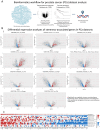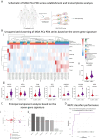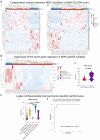Unmasking Neuroendocrine Prostate Cancer with a Machine Learning-Driven Seven-Gene Stemness Signature That Predicts Progression
- PMID: 39518911
- PMCID: PMC11545501
- DOI: 10.3390/ijms252111356
Unmasking Neuroendocrine Prostate Cancer with a Machine Learning-Driven Seven-Gene Stemness Signature That Predicts Progression
Abstract
Prostate cancer (PCa) poses a significant global health challenge, particularly due to its progression into aggressive forms like neuroendocrine prostate cancer (NEPC). This study developed and validated a stemness-associated gene signature using advanced machine learning techniques, including Random Forest and Lasso regression, applied to large-scale transcriptomic datasets. The resulting seven-gene signature (KMT5C, DPP4, TYMS, CDC25B, IRF5, MEN1, and DNMT3B) was validated across independent cohorts and patient-derived xenograft (PDX) models. This signature demonstrated strong prognostic value for progression-free, disease-free, relapse-free, metastasis-free, and overall survival. Importantly, the signature not only identified specific NEPC subtypes, such as large-cell neuroendocrine carcinoma, which is associated with very poor outcomes, but also predicted a poor prognosis for PCa cases that exhibit this molecular signature, even when they were not histopathologically classified as NEPC. This dual prognostic and classifier capability makes the seven-gene signature a robust tool for personalized medicine, providing a valuable resource for predicting disease progression and guiding treatment strategies in PCa management.
Keywords: gene signature; large cell neuroendocrine carcinoma; machine learning; neuroendocrine transdifferentiation; prognosis; prostate cancer; stemness.
Conflict of interest statement
The authors declare no conflicts of interest. The funders had no role in the design of the study; in the collection, analyses, or interpretation of data; in the writing of the manuscript; or in the decision to publish the results.
Figures






Update of
-
Unmasking Neuroendocrine Prostate Cancer with a Machine Learning-Driven 7-Gene Stemness Signature that Predicts Progression.medRxiv [Preprint]. 2024 Sep 25:2024.09.24.24314303. doi: 10.1101/2024.09.24.24314303. medRxiv. 2024. Update in: Int J Mol Sci. 2024 Oct 22;25(21):11356. doi: 10.3390/ijms252111356. PMID: 39399052 Free PMC article. Updated. Preprint.
References
-
- Bray F., Laversanne M., Sung H., Ferlay J., Siegel R.L., Soerjomataram I., Jemal A. Global Cancer Statistics 2022: GLOBOCAN Estimates of Incidence and Mortality Worldwide for 36 Cancers in 185 Countries. [(accessed on 18 July 2024)];CA Cancer J. Clin. 2024 74:229–263. Available online: https://acsjournals.onlinelibrary.wiley.com/doi/10.3322/caac.21834. - DOI - PubMed
-
- Beltran H., Rickman D.S., Park K., Chae S.S., Sboner A., MacDonald T.Y., Wang Y., Sheikh K.L., Terry S., Tagawa S.T., et al. Molecular Characterization of Neuroendocrine Prostate Cancer and Identification of New Drug Targets. Cancer Discov. 2011;1:487–495. doi: 10.1158/2159-8290.CD-11-0130. - DOI - PMC - PubMed
MeSH terms
Substances
Grants and funding
LinkOut - more resources
Full Text Sources
Medical
Research Materials
Miscellaneous

